- Home
- Jeremy Robinson
Blackout ck-3 Page 2
Blackout ck-3 Read online
Page 2
For a long time, the opposing forces vied for dominance, like objects being weighed in a scale, but as the initial shock of the demon’s counterattack began to subside, more and more voices returned to the chorus. The grinding noise of the earthquake diminished into nothingness as the air began to vibrate once more to the sound of that single ancient and potent word.
Vima was not conscious of the moment when the struggle ended. Like the transition between wakefulness and sleep, it happened with imperceptible subtlety. He did not notice the abrupt end of the tremor or the final crushing sound of boulders dislodged in the quake settling into place. It was only when the stranger spoke again-loudly and in the language of the Kushans-that Vima realized they had won.
“It is finished.”
Vima’s eyes fluttered open and he let the mantra slip away into a sigh. The air around him was thick with settling dust, but through the pall, Vima could see that something had changed. The area that had once been scoured clean by the demon’s appetite was shot through with gaping cracks and littered with loose rocks, but the most dramatic difference was the cave itself. No longer was there evidence of the surreal nothingness, the hole in reality, which had marked the demon’s presence.
Angra Mainyu was gone.
A low wail began to issue from the villagers, cries from those who had suffered minor injuries during the quake and complaints from some who could, even from a distance, see that their homes had been knocked flat, but Vima paid no heed.
“We did it!” he cried, turning to the stranger. “We have defeated the demon.”
The foreign man gave a heavy sigh. “A darkness like this can never be truly defeated. It only slumbers. But you are safe for the present.”
“Slumbers?” The chief magus stepped forward. Vima could see the roiling emotions in his expression-gratitude for the salvation of the village, despair arising from his utter failure to find that salvation in the teachings of the prophet. “Will it awaken? What can we do to prevent its return?”
The stranger considered the question for a moment, and then gestured toward the cliff where the demon’s cave now looked like just another anonymous pockmark in the stone face. “Though you cannot see it, the darkness is there. What will awaken it, I cannot say, but in the same way that you have defeated it today, you can keep it at bay.
“Consecrate this ground. Make this a sacred place; a place where holy men may contemplate the nature of the cosmos.” He paused thoughtfully. “But you must never speak of the darkness, or of what happened here today. Make no record of this occurrence. It is in the nature of men to believe that forces such as this can be controlled, and it may be that in keeping alive the memory of this day, the temptation to awaken the darkness will prove too great to resist. You must let what happened here today slip from your memory, as if something glimpsed in a dream.”
Despite the wisdom underlying the admonition, Vima knew that the stranger was asking the impossible. None of the villagers would ever forget this day; how could they? Not only had they all participated in the cataclysmic battle with the demon of darkness, they had also borne witness to the failure of their God. And had not word of the demon’s siege on their village spread throughout the empire, carried by travelers along the Silk Road?
No, Vima was quite certain that the events of this day would be spoken of for hundreds, even thousands of years to come.
But Vima was wrong.
In the years that followed, the influence of the magi and the teachings of Zoroaster declined as more and more people began to learn the ways of the Enlightened One-the Buddha-and as belief in Ahura Mazda waned, so also did the recollection of stories-superstitious fables-about demons and otherworldly entities.
Within two generations, the cliff where a warrior named Vima had once faced an entity of indescribable darkness had become a place where monks carved out caves in which to meditate on the nature of the universe. Three hundred years later, long after the Kushan Empire fell to the Sassanids, and shortly before the subsequent conquest by the Hephthalite Confederation, devotees of the Buddha hewed from the cliff face two extraordinary likenesses of their legendary spiritual leader, thereby unknowingly carrying out the long forgotten stranger’s admonition to consecrate the ground where the demon still slept.
It would be nearly fifteen hundred years before darkness of a very different sort would descend upon the land.
SEQUENCE/CONSEQUENCE
1
Paris, France, 1835 UTC/Local
Bill Downey studied his reflection in the ornate gilt-framed mirror and liked what he saw.
“My goodness,” he said, managing what to his ear sounded like a spot-on impression of Cary Grant, “Aren’t you just a handsome devil.”
He experimented with a few different smiles as he adjusted his bow tie, smoothed the wrinkles from his rented dinner jacket, and then spritzed a few mores ounces of Axe body spray around his neck and throat.
“Oh, yeah,” he said to his reflection, now sounding nothing at all like Cary Grant. “Watch out, Paris. I’m getting lucky tonight.”
His streak of good luck had actually begun more than two months earlier when, completely out of the blue, he had received an invitation to attend the Global Energy Future meeting in Paris. A lifelong resident of the American Midwest, Downey had never even considered taking a European vacation; his idea of a getaway involved palm trees, fruity cocktails adorned with umbrellas, and lots of women wearing bikinis. But this was an invitation he simply couldn’t refuse.
As operations manager of Omaha Public Utility District station 4-a coal-fired 1,200-megawatt producing power plant on the banks of the Missouri River-attending regional conferences was part of the job. The city usually picked up the tab for travel and lodging, and supplied him a stingy per diem, but that hardly made up for the long hours spent poring over charts and statistics in an endless succession of Powerpoint presentations. That the GEF conference was a much higher profile event-not just regional or even national, but global in scale-taking place in the legendary City of Lights, barely made an impression on him…until he read the invitation letter more carefully. Oh, there would be speeches and presentations, but the conference organizer was handling the logistical side, to include business-class air travel and a week’s stay at the legendary Hotel Ritz, with complimentary concierge service. The sponsors of the event seemed to have very deep pockets and no compunction regarding how their money was spent. The program for the conference was built around three six-hour days, leaving ample time for site-seeing and nightlife, culminating in what promised to be a spectacular casino event aboard a private riverboat on the Seine. As he reviewed the letter, Downey’s first thought had been: This is too good to be true. But after another reading, that had changed to: This is too good to pass up.
The conference itself had been unremarkable, focusing on vague strategies for dealing with the increasing need for more energy production in developing countries, the importance of retrofitting existing power grids and developing a comprehensive energy policy that included alternative and renewable sources-what Downey thought of as hippy-dippy bullshit. But the short presentations, which he wasn’t even obligated to attend, had passed quickly, while the nights had been amazing. The concierge had directed him to the best nightclubs in the city and although he hadn’t managed to close the deal with any Parisian ladies, he’d had a lot of fun trying. All his life, he had heard that the French, and Parisians in particular, were rude, stuck-up and hated Americans, but that had not been his experience. Of course, that might have had something to do with the Platinum AmEx card the conference organizer had given each attendee.
Downey was still primping when an insistent knock disrupted his musings. He shot a glance at his watch. Six-forty, he thought. He had arranged to have a car waiting at quarter to seven, but there was no reason not to get a head start on the night’s activities. Odd that they came to the room, but whatever.
He ambled through the luxurious suite and threw open the door. �
��You’re early…”
His voice trailed off as he found himself once more facing his reflection. No, that wasn’t right. A mirror would show a perfect image of him, as he was now, one hand on the doorknob, a quizzical expression on his face. This was something else; him in every detail, standing motionless with a determined, but faintly amused expression. “What the-?”
With an almost unnatural swiftness, the double stepped forward into the suite. With one hand, he swept the door closed behind him. The other hand reached out for Downey, who caught just a glimpse of the oblong black object in the newcomer’s hand as it was pressed against his abdomen. A loud crackling sound filled his ears and every muscle in his body contracted instantly. He went rigid and a burning pain spread through his extremities. A moment later, Downey dropped where he stood, his legs folding awkwardly beneath him. He was still conscious, but that mattered little; he felt as if he had been unplugged from his body.
He saw the face that was an almost perfect duplicate of his own hovering above him, but even as he struggled to regain control of his flaccid limbs he felt a sting in the side of his neck and his world quickly dissolved into darkness.
2
King quickly withdrew the hypodermic needle from Bill Downey’s neck and after slipping the safety cap over the glinting metal tip, deposited it in the pocket of his dinner jacket. Then he drew back a few steps and breathed in through his nose, fighting an impulse to sneeze. The fragrance wafting up from the motionless form had triggered some kind of allergic reaction; it smelled like the man had practically bathed in some kind of cologne or body spray. A good sneeze would have been very satisfying, ridding his nostrils of the offending vapors, but the professional make-up artist who had, eight hours previously, transformed King’s rugged features into an almost perfect likeness of the power plant manager had cautioned him to avoid any activities that might dislodge the applique of latex and cosmetics.
“Sorry you won’t be making the party,” he told the unconscious man when the irritation in his nasal membranes subsided. “But look on the bright side. I spared you the disappointment of rejection. Here’s a tip for next time: subtlety.”
King suppressed a chuckle. Laughter was another proscribed action, as was eating, and as he knelt over Downey again, dragging the body over to the neatly made bed, a deep rumble in his gut reminded him of just how hungry he was.
He vividly remembered the last real meal he had eaten, that wasn’t a power bar or quickly devoured snack food. Two days earlier, he’d been enjoying a well deserved and much needed day off, relaxing with Sara and Fiona-his family-at a cabin in New Hampshire’s Pinckney Bible Conference Grounds, which had been turned back over to the owners and re-opened to the public. Manifold Alpha, the secret base hidden beneath the mountain behind the campground, had been converted to better suit Endgame, the new black ops organization of which Chess Team was the core. Endgame had also purchased a number of the cabins, which could be used by personnel for recreation. It had been a strangely perfect day, strange because for the first time in a long time, he hadn’t felt like ‘King,’ hadn’t felt like the field leader of an ultra-secret special operations team, but instead had savored the chance to just be Jack Sigler.
Except that wasn’t quite right. His Chess Team callsign wasn’t an alter ego, a secret identity that he put on and took off like some kind of comic book superhero’s costume. He hadn’t sublimated the ‘real’ Jack Sigler to become King. If anything, becoming a spec ops soldier, leading the lethal shooters of Chess Team into dangerous and highly classified missions against the worst kinds of terrorists, literally saving the world from threats that most people would find incomprehensible, was the very essence of who Jack Sigler was.
Or rather, who he had been. Lately, he had begun seeing things from a very different perspective.
Two days ago, hunched over the barbecue grill turning burgers and brats, with his girlfriend Sara lounging nearby sipping a Sam Adams and his foster daughter Fiona exploring the adjacent woods…that was when, for what seemed like the first time in his life, he’d gotten a taste of what it would be like to live as a normal person. And to his complete surprise, he found that he kind of liked it.
He didn’t harbor any resentment for the sacrifices he had made in the name of duty, no sorrow for the life he might have had. It wasn’t like that at all. He was proud of his service, proud of what Chess Team had accomplished. The world would never know how close or how often it had come to the brink of total destruction. If not for Chess Team, there would be no family vacations, no scenes of domestic tranquility, for anyone at all, and that was not something he took lightly.
From the moment he had enlisted in the Army, galvanized into action by the death of his sister Julie, who had herself answered a similar call by becoming an Air Force fighter pilot, he had never looked back on what might have been. There had been no need. His brothers-in-arms, and particularly his fellow Chess Team operators, were all the family he needed. He had never imagined finding happiness and contentment in a long-term romantic relationship, much less having children of his own. To his surprise, happiness and contentment had found him.
Sara Fogg, an infectious disease investigator for the Center for Disease Control and Prevention, had been his girlfriend for more than two years now. Her job kept her just as busy as Chess Team did him, and from the beginning, they both understood that theirs would be a relationship built on rare treasured moments together. Nevertheless, those moments seemed too few and far between. There was a reason, after all, that relationships were an endangered species in the world of military special operations.
And then there was Fiona.
The teenaged girl had come into his life as a refugee, the lone survivor of a diabolical act of terrorism, hunted by a relentless villain with almost godlike abilities, desperately in need of a protector, but had instead become something much more.
A woman he would be proud to have as a wife and a daughter he cherished… King had accidentally become a family man, and he deeply believed that family deserved more than just stolen moments between missions. Loving someone was a lot more than just protecting that person from harm.
As he had dropped one sizzling bratwurst after another into a line of split stadium rolls, assembling them in an orderly row on a serving platter, he’d considered just what possibilities for happiness the future might hold, and what path to take to get there.
An insistent vibration in his pocket had thrown a monkey wrench into his musings. His phone: Deep Blue on the other end.
“Can’t this wait?” King had growled, eschewing the normal pleasantries.
“I’ll let you be the judge of that,” the reply had come. “We’ve got him, King. We found Brainstorm.”
That had been the end of the picnic.
3
New Hampshire-Two days earlier
The hamburger King had wolfed down during the short drive from the bungalow to the entrance to Endgame HQ, now sat in his gut like a brick as he waited for the elevator doors to open.
Brainstorm!
Twice now, King had tangled with operatives of what he had dubbed the Brainstorm network, and twice he had narrowly averted unimaginable catastrophe, yet in spite of Brainstorm’s audacity, King knew next to nothing about…it? They? The working hypothesis, a construct of innuendo and supposition, was that Brainstorm was a very sophisticated artificial intelligence-a self-aware computer program-secretly pulling the strings of several multinational corporations and possibly exerting influence in the halls of power, but months of investigation had yielded nothing more than rumors and wild conspiracy theories.
The uncertainty about what shape his own future might take didn’t include Brainstorm. This was personal.
The steel doors slid back and King hastened down a utilitarian corridor and boarded an underground tram that whisked him to the Central portion of the base, ten miles away, under Mount Tecumseh. When he arrived, he disembarked and made his way down another corridor, then burst int
o the Chess Team op center where Tom Duncan and Lewis Aleman were waiting.
Tom Duncan had once been the leader of the free world-the President of the United States-but King didn’t feel like he knew President Duncan. To him, the athletically built, mostly bald Duncan would always be Deep Blue, the creator, brains and guiding hand of Chess Team.
“Well?” King said, even before the door closed behind him. “Let’s have it.”
Deep Blue nodded, his eyes alight with barely contained enthusiasm. “I’ll let Ale fill you in, since he’s the one who did all the work.”
The lanky Lewis Aleman beckoned King to join him at a workstation. Aleman, a former spec ops shooter and Chess Team’s resident tech expert didn’t have a callsign, but his unofficial nickname was R2D2, because like the stubby robot from the Star Wars movies, when it came to computer systems, there wasn’t much he couldn’t accomplish once he plugged in.
“As you know, I’ve spent the last couple weeks following the money trail from Sokoloff to Brainstorm.”
King nodded absently, his thoughts flashing back to the final confrontation with the Russian hitman in the Superstition Mountains of Arizona. Following the brutal struggle, King had found their best lead to unraveling the mystery of Brainstorm-a cell phone that contained a complete record of the hired killer’s dealings with the elusive mastermind.
Aleman gestured to the computer monitor, which displayed rows of numbers. “I’ve had to tread carefully so as not to tip our hand, but I was able to trace the transactions from Sokoloff to an account in the Cayman Islands, and from there to several other accounts.”
King gave the list a second look and saw the dollar signs in the second column. Each account balance ran to eight figures. “So Brainstorm has more money than God. That’s not exactly news.”

 Alter
Alter From Above - A Novella
From Above - A Novella Flux
Flux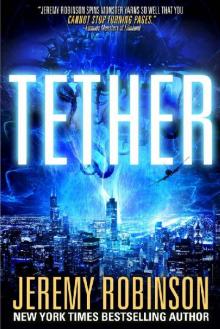 Tether
Tether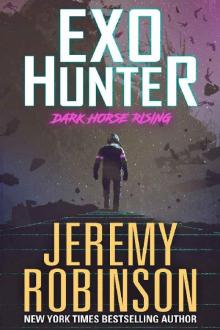 Exo-Hunter
Exo-Hunter Pulse
Pulse Cannibal
Cannibal Omega: A Jack Sigler Thriller cta-5
Omega: A Jack Sigler Thriller cta-5 Flood Rising (A Jenna Flood Thriller)
Flood Rising (A Jenna Flood Thriller) Viking Tomorrow
Viking Tomorrow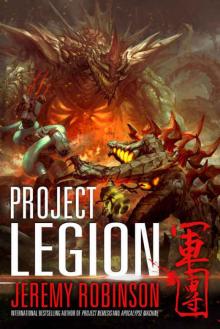 Project Legion (Nemesis Saga Book 5)
Project Legion (Nemesis Saga Book 5) BENEATH - A Novel
BENEATH - A Novel Kronos
Kronos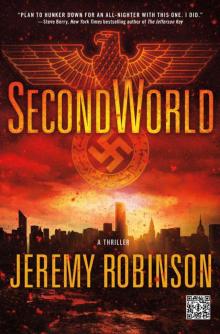 SecondWorld
SecondWorld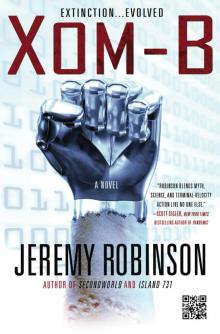 XOM-B
XOM-B Forbidden Island
Forbidden Island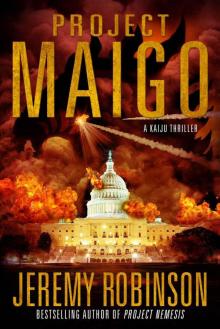 Project Maigo
Project Maigo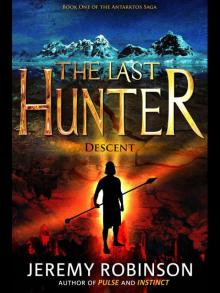 The Last Hunter - Descent (Book 1 of the Antarktos Saga)
The Last Hunter - Descent (Book 1 of the Antarktos Saga) Jack Sigler Continuum 1: Guardian
Jack Sigler Continuum 1: Guardian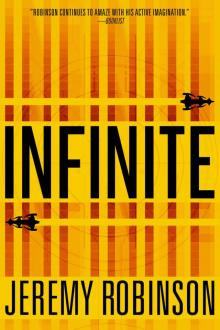 Infinite
Infinite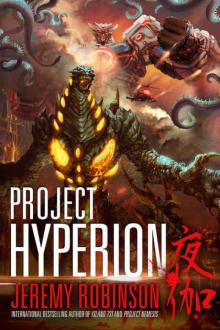 Project Hyperion
Project Hyperion The Distance
The Distance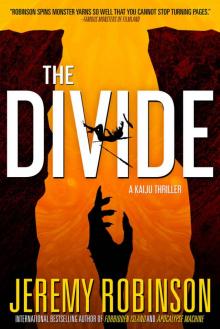 The Divide
The Divide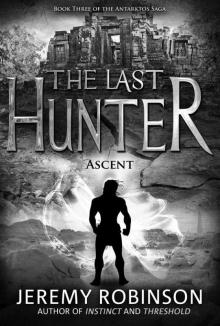 The Last Hunter - Ascent (Book 3 of the Antarktos Saga)
The Last Hunter - Ascent (Book 3 of the Antarktos Saga)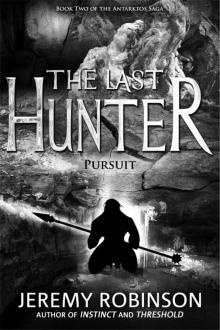 The Last Hunter - Pursuit (Book 2 of the Antarktos Saga)
The Last Hunter - Pursuit (Book 2 of the Antarktos Saga) Raising the Past
Raising the Past The Others
The Others The Last Hunter - Collected Edition
The Last Hunter - Collected Edition Threshold
Threshold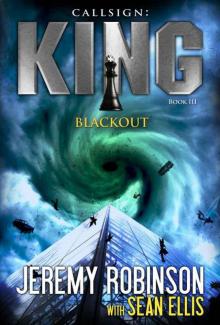 Blackout ck-3
Blackout ck-3 Antarktos Rising
Antarktos Rising Viking Tomorrow (The Berserker Saga Book 1)
Viking Tomorrow (The Berserker Saga Book 1) The Didymus Contingency
The Didymus Contingency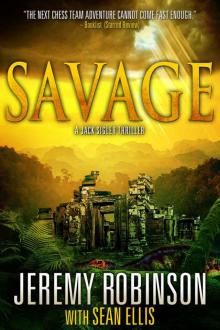 Savage (Jack Sigler / Chess Team)
Savage (Jack Sigler / Chess Team)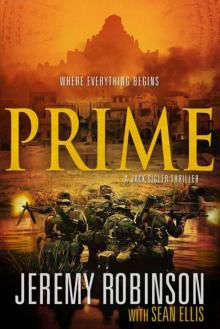 Prime
Prime Insomnia and Seven More Short Stories
Insomnia and Seven More Short Stories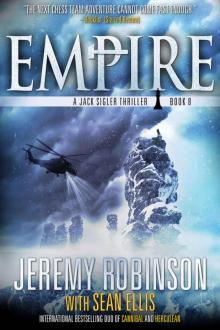 Empire (A Jack Sigler Thriller Book 8)
Empire (A Jack Sigler Thriller Book 8)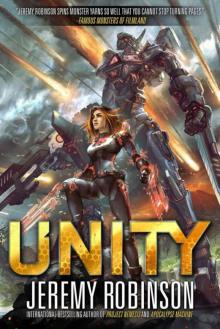 Unity
Unity Instinct
Instinct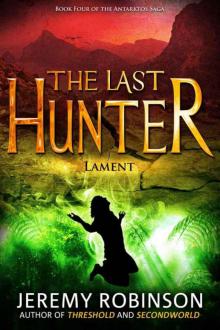 The Last Hunter - Lament (Book 4 of the Antarktos Saga)
The Last Hunter - Lament (Book 4 of the Antarktos Saga)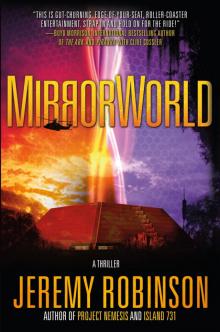 MirrorWorld
MirrorWorld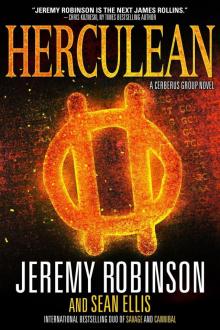 Herculean (Cerberus Group Book 1)
Herculean (Cerberus Group Book 1)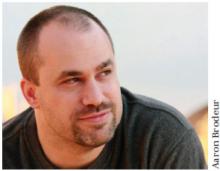 Island 731
Island 731 Omega: A Jack Sigler Thriller
Omega: A Jack Sigler Thriller Patriot (A Jack Sigler Continuum Novella)
Patriot (A Jack Sigler Continuum Novella) 5 Onslaught
5 Onslaught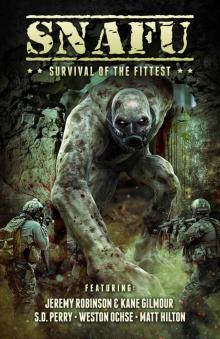 SNAFU: Survival of the Fittest
SNAFU: Survival of the Fittest Helios (Cerberus Group Book 2)
Helios (Cerberus Group Book 2)